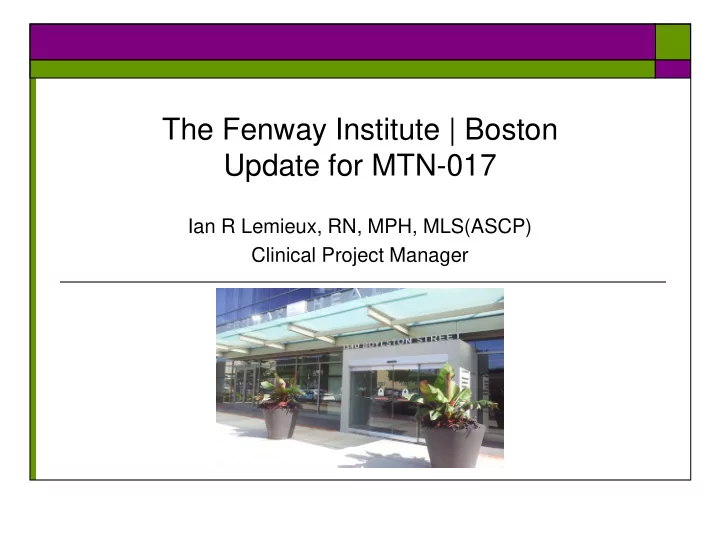

The Fenway Institute | Boston Update for MTN-017 Ian R Lemieux, RN, MPH, MLS(ASCP) Clinical Project Manager
Presentation Outline Study Progress Best Study Practices Challenges Implementing MTN-017 Strategies to Address These Challenges Lessons Learned
Study Progress Date of activation: 06 Sep 2013 First enrollment: 25 Sep 2013 How many participants screened and how many enrolled: Screened: 12 Enrolled: 7 Screen fails: 5 (refused to use condoms, difficult work schedule, 3 x rectal exam findings) S:E ratio: 1.7 Retention numbers: 86% 1 voluntary withdrawal (military service)
Best Study Practices Conducting pre-screen consultations, after phone pre-screen and prior to screen visit Splitting screen visits (v1.0a and v1.0b) Engaging past participants Utilizing a consistent visit flow Scheduling staff resources in advance Preparing visit forms, clinical and lab supplies prior to participant arrival
Best Study Practices Regular clinical supervision for counseling Pharmacy labeling/printing system established for MTN-017 study product Completing timely visit QC procedures Maintaining regular communication with internal and external team members Seeking PSRT consultation regarding enrollment eligibility, adverse events, potential clinical hold/resume scenarios
Challenges Implementing MTN-017 Product use instructions for Rectal RAI period Contacted FHI360; suggested a pictorial flow sheet of product use be developed SMS reminder errors: received late, not received, no response to messages sent Continue to utilize the alias email for support: mtn017sms@mtnstopshiv.org Include related documentation and correspondence in participant charts
Unresolved Challenges None
Lessons Learned Pre study implementation Building off of rectal microbicide and MTN protocol experience with Project Gel (McGowan R01; tenofovir gel study, 18-30 y/o MSM), MTN- 007 and MTN-013; SOPs; source docs; supplies PBMC processing via existing relationships (courier service and ACTG research lab) Post study implementation 48-72hr and 2wk post-initiate visit phone calls are helpful to participants – staff can answer participant questions and review AEs Best to maintain participant-counselor consistency throughout study whenever possible
Lessons Learned Accrual and retention Create unique recruiting materials that can be used across media formats Screen failures can be unpredictable when recruiting from the general population Maintaining regular communication (ie. reminder calls), providing referrals, and establishing rapport with/for participants
Recruitment Material Design
Lessons Learned Clinical 2 nd rectal period first dose or simulation in clinic seems redundant, some participants refused given that they had completed this step at the start of their 1 st rectal period
Pharmacy Update None
Behavioral Update CASI Administration – no problems SMS System – as noted PK Data and Data Convergence Interviews – no problems; site acknowledges time required to prepare for, conduct, and closeout each session In-Depth Phone Interview – no problems; 1 completed to date
Laboratory Update Specimen collection – no problems Processing – no problems Shipping – request for clarification regarding process for return of empty STP/dry ice shippers to site Receipt of results – no problems; all results have been received prior to PK convergence
Counseling Update Protocol – no problems HIV/STI – no problems Product Use – as noted Adherence – as related to PK convergence: how to promote discussion when PK results are ‘detectable’; reviewed with Ivan Clinical supervision helpful to site staff
Any Questions?
Recommend
More recommend